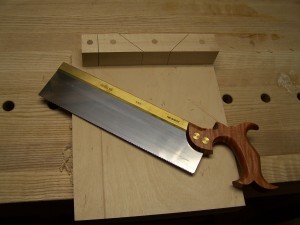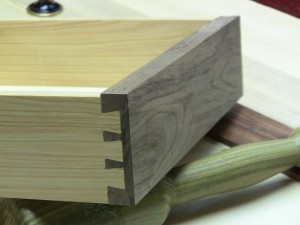Woodworking Isn’t Rocket Science
 I try not to rant on this blog, but if I can’t rant on my own blog then where can I? Woodworking is not rocket science. There is no one way to do something nor is there a wrong way (assuming it is safe). Techniques change from project to project and year to year not so much because one was better than the other but because that method suited the individual woodworker or project better.
I try not to rant on this blog, but if I can’t rant on my own blog then where can I? Woodworking is not rocket science. There is no one way to do something nor is there a wrong way (assuming it is safe). Techniques change from project to project and year to year not so much because one was better than the other but because that method suited the individual woodworker or project better.
As an example, I own 2 very nice tenon saws and they have cut many a tenon cheek. Lately however, they sit in my saw til as I am splitting out all my tenon cheeks and paring to fit. Is splitting tenons better than sawing them? Have my experience points reached the point where I level up and now have tenon splitting skills? None of the above. I do think my chisel handling skills have improved to the point where I feel confident in paring a tenon cheek to a piston fit. I find this to be not so much faster or even really more accurate than other methods (router plane, rabbet block, etc) but it is more convenient. I saw a shoulder, split with a chisel then pare using the same chisel. I don’t have to reach for a different tool or even adjust the workpiece in my vise. I haven’t clocked it but it feels more efficient and frankly I like paring. Maybe you disagree, and thank God for that, because the options for cutting joinery is one of the things that makes woodworking interesting. It also gives us options for the times when your preferred technique just won’t work. I still have tenon saws and I’m confident in my sawing accuracy that I can fall back on them when that time comes. It will come.
 I think the worst reason for doing something (or teaching it) is because that is the way you were taught to do it. Chuck Bender taught me how to cut tight dovetails pins first with just a saw and a chisel. Today I cut them tails first and use a fretsaw to quickly remove the waste then pare to the line. I told you I like paring. There is nothing wrong with pins first and one look at Chuck Bender’s dovetails will tell you that obviously the way he does it works great. I even tried Allan Breed’s method for cutting dovetails. It was a mess and though I’m sure I would get better with more practice holding the saw the way he does, that method just isn’t for me. I did learn a new way to wield a saw and someday that may come in handy. I know why I like to cut dovetails that way I do and I know why I don’t do it other ways. Sometimes this is a very personal reason other times it has to do with the environment (work holding, tools available, hand/eye dominance, lighting, etc). The point being that understanding why one methods works for you is more important.
I think the worst reason for doing something (or teaching it) is because that is the way you were taught to do it. Chuck Bender taught me how to cut tight dovetails pins first with just a saw and a chisel. Today I cut them tails first and use a fretsaw to quickly remove the waste then pare to the line. I told you I like paring. There is nothing wrong with pins first and one look at Chuck Bender’s dovetails will tell you that obviously the way he does it works great. I even tried Allan Breed’s method for cutting dovetails. It was a mess and though I’m sure I would get better with more practice holding the saw the way he does, that method just isn’t for me. I did learn a new way to wield a saw and someday that may come in handy. I know why I like to cut dovetails that way I do and I know why I don’t do it other ways. Sometimes this is a very personal reason other times it has to do with the environment (work holding, tools available, hand/eye dominance, lighting, etc). The point being that understanding why one methods works for you is more important.
Where is all this coming from? Ever since I launched the Hand Tool School, I have been getting a steady barrage of flak coming my way. Who is this guy? Where did he train? Is he a professional? How long has he been woodworking? How is he qualified? Some of it comes from individuals and some of it from the woodworking “establishment”.
I’m tired of trying to justify my methods and my background. Have I built as much as a cabinetmaker of 30+ years? Of course not! Do I have access to more knowledge and techniques in multiple formats now than when that veteran started working? Absolutely! This allows me to try many different techniques and learn how they work. Has woodworking changed significantly in the last 2000 years? Nope! It all boils down to a few techniques: how to saw to a line, wield a plane, and use a chisel. Every task you encounter breaks down to these 3 things in some shape or form. Does accurate sawing require 30 years to master? I wager that many of us have a solid grasp on it after a weekend spent dimensioning parts for a single project. Same thing with planing. Force yourself to not use the power planer and jointer and you will be surprised just how quickly you are able to flatten a board out of necessity. Now add those power tools back in and your job just became that much easier.
I haven’t been working wood for 30 years yet somehow I managed to take Walnut from rough sawn boards to flat and square on 6 sides to a box with gap free compound dovetails in 5 hours of work this weekend. Does this make me a savant? Hell no! I just did it using sawing, chiseling, and planing skills. I’ll say it again, this isn’t rocket science folks. There are some very basic skills that underlie everything we do. Understanding these skills will make you a better woodworker and I don’t think it takes 30 years. Heck it doesn’t even take a year. Accept that every new project will present a challenge and virgin territory. But each challenge breaks down to those basic skills. That’s what I’m teaching at The Hand Tool School and I have scores of emails and images from happy members who are thrilled with how their projects are turning out after just a single week or month of woodworking.
Let me put it to you another way. I have formal training as a musician and pieces of paper hung on my wall certifying that. I have more than 30 years of experience singing and performing in front of large crowds. Does this mean that I can pick up a brand new piece of music and be performance ready in seconds? Probably not, but I can do a passing job by falling back on my core skills of sight reading, music theory, and my understanding of the anatomy of the human voice. None of these things have changed since I learned them 30 years ago but I still apply them every time I am confronted with a new piece. Every now and then I meet a new challenge when I’m forced to hit that high B flat on an open vowel at full voice and sustain it for 8 beats (not an easy feat for a Baritone). I fall back on my basics, prepare my breath, modify the vowel, raise my soft palate, bounce the sound off my hard palate to make it ring. In other words, I saw to the line and pare it to fit. If you had asked me how I would handle that B flat 29 years ago, I would have told you the same thing…and I would have done it just as successfully then as I would now. (I have the recording to prove it) What have my 30 years of experience done for me? Filled my head with songs and qualified me to play older parts when I audition for a show.
So question my ability to teach woodworking all you want, I’m just going to keep applying the same fundamental skills over and over again, changing my technique to suit my needs, and building stuff.
Your Turn
What is the most complicated woodworking task you can think of or that scares you the most? I’ll bet you can break it down to a few simple skills.


